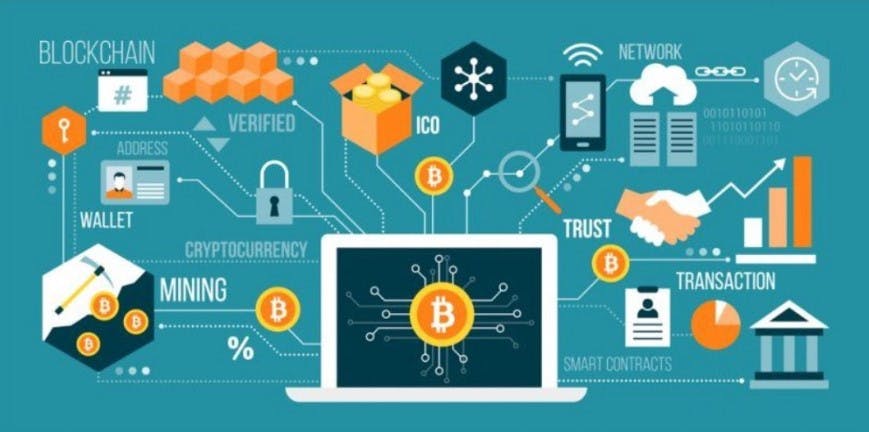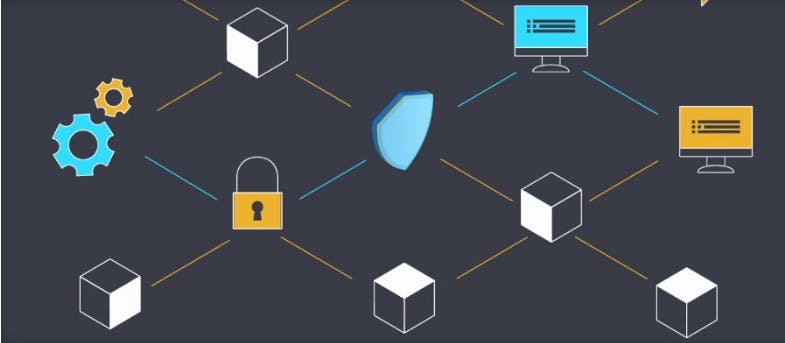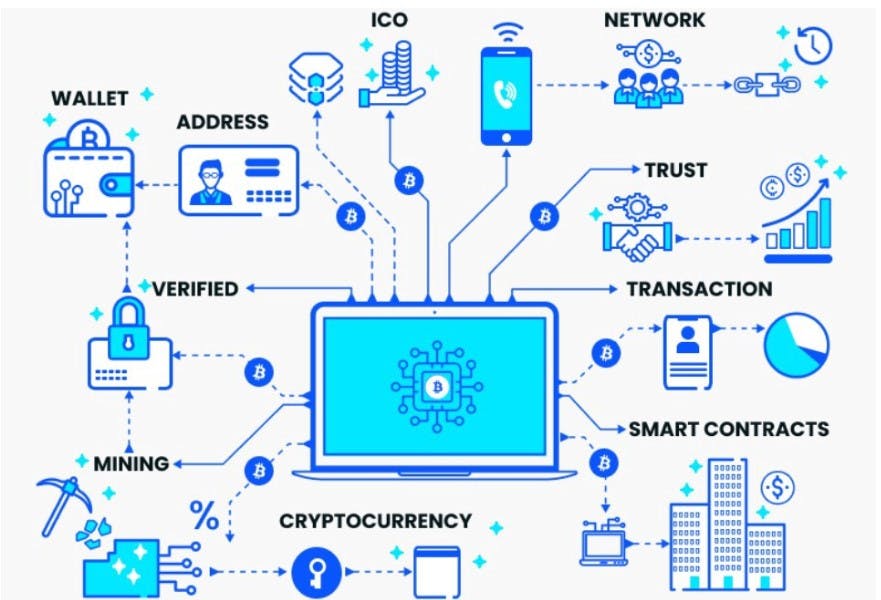The Best Blockchain Use Cases for in Real Life (IRL) Events
 source: Solutionhub
source: Solutionhub
Imagine a world where our daily activities are facilitated by blockchain technology. From the food we eat, to the clothes we wear, to the energy we consume - everything is tokenized and tracked on a decentralized ledger. It may sound like a scene from a science fiction movie, but it is not far-fetched.
The blockchain is an unalterable, distributed, and public ledger of transactions that promotes anonymity, security, and immutability of data transactions. In fact, blockchain has been a revolutionary development for many industries, and our imagination only limits its potential applications.
With a lot to learn about this relatively new technology, it is pertinent to explore the best practicability of blockchain in the real world. This guide will explain the basics of blockchain and buttress the best applications in real life.
Understanding Blockchain Technology
 Source: Mantra Labs
Source: Mantra Labs
Before exploring the best use cases of blockchain, let's understand the basics of this technology.
In its basic form, a blockchain is a digital ledger of economic transactions that can be programmed to record virtually everything of value. The term "blockchain" comes from its structure. That is, a file made up of blocks of data, and each block links to the previous one, thereby forming a chain.
Blockchain technology is essentially a distributed database that allows direct peer-to-peer transactions on a decentralized network of computers called "nodes." Each node on the blockchain is capable of adding transactions or querying newly added transactions on the chain.
Blockchain technology springs from the activities of a subset of nodes (called miners) who solve cryptographic puzzles to win the rights to validate transactions. After which, the solved transactions are bundled into "blocks" and added to form a ledger.
The important characteristics of blockchain technology are:
Decentralization: The ledger is not maintained by any central authority but is instead shared across the network of nodes. This feature eliminates the monopoly of control over the blockchain.
Immutability: Once a transaction is recorded on the blockchain, no one can alter it. This is because blocks have unique features called "hashes." The hash value for each block is linked to its transaction data. Therefore, any attempt to alter block data will also affect the hash. This makes it impossible to alter a block's hash without changing the hash of the previous one.
Transparency: The ledger is public and viewable by anyone on the network. The data is distributed across different computers; therefore, all users have the right to view the blockchain from anywhere.
Security: Blockchain technology is very secure as it uses cryptography to protect data. Also, because it is a decentralized way of accessing and storing data increases the security of blockchain technology. Unlike a centralized database, blockchain does not have a single point of entry for attackers.
Anonymity: Participants on the blockchain network are anonymous. As such, the user's privacy is guaranteed.
Based on these features (and the hopes for future advancements), it is easy to see why blockchain technology is being integrated into our daily lives.
Current Blockchain Realities
Currently, the world is looking beyond the potential of blockchain technology to its real-life applications. Blockchain use cases are not just limited to cryptocurrencies as popularly known but also extend to other areas of human endeavors.
In the past few years, we have seen more interest and investment in blockchain-based projects. For instance, a report shows that about $30.3 billion was raised by blockchain projects and startups during the first half of 2022. And this is just the tip of the iceberg, as the world is still discovering other interesting use cases of this technology.
The potentials of blockchain technology have been explored in various sectors such as healthcare, supply chain management, finance, insurance, government, and many more. However, its adoption has been challenging as the technology is still in its infancy.
Technology enthusiasts in the industry, academics, and the public sector are working to improve blockchain use cases. Nevertheless, some compelling use cases of blockchain already show great promise.
The Current Best IRL Blockchain Use Cases
 Source: Huawei
Source: Huawei
Blockchain technology has the potential to revolutionize how we interact with the digital and physical world. Some of the best use cases of blockchain that are being implemented in the real world include:
Healthcare
The healthcare sector is one of the most promising sectors for blockchain technology because there are several expensive problems that it can solve. For instance, the industry is plagued with constant data breaches, and this is where blockchain can offer a solution. The adoption of blockchain in healthcare can help to securely store and share patient data, track medical supplies, and manage clinical trials.
In addition, blockchain can create a decentralized platform for health data exchange. This will enable patients to have more control over their health data. Also, using blockchain in healthcare can help reduce fraudulent activities in insurance claims by creating a transparent and tamper-proof system.
Several healthcare institutions like Chronicled, BurstIQ, EncrypGen, etc., are already piloting different blockchain projects. For instance, Kaiser Permanente is using blockchain to store health records, while Mount Sinai uses blockchain technology to track long-term care for IBD patients.
Supply Chain Management
The supply chain management sector is also benefiting from blockchain technology. The adoption of blockchain in this sector can help to track the movement of goods, ensure transparency, and reduce the cost of the supply chain process.
Generally, supply chain management faces problems with a lack of transparency of product information moving along the supply chain and issues in product authenticity, as various consumers often receive counterfeit goods. Blockchain technology can track the provenance of products which will help to ensure only products that are safe and meet quality standards are delivered to customers.
In addition, blockchain can create a decentralized marketplace for buying and selling goods. This will help to reduce the cost of intermediaries and ensure that buyers and sellers have direct access to each other.
Finance
The finance sector is one of the most active sectors in adopting blockchain technology. You certainly have heard about the "DeFi" term, a decentralized finance system created on secure distributed ledgers similar to those used by cryptocurrencies.
Blockchain technology flourishes in international payments, money transfers, and remittances as it can help to reduce the cost and time of these transactions. Following the success of Bitcoin and other cryptocurrencies, numerous financial institutions are exploring using blockchain for various purposes such as securities trading, cross-border payments, etc.
For instance, Ripple is a blockchain company working with several banks to pilot its technology for international money transfers. In 2018, Banco Santander launched the world's first blockchain-based money transfer service, known as "Santander One Pay FX," that uses Ripple's xCurrent to enable customers to make same-day or next-day international money transfers.
Furthermore, using blockchain in finance can help to reduce fraudulent activities through its sophisticated security encryption system. TheAsymmetric Cryptography feature of blockchain ensures blockchain creates a pair of keys for each user. The Public key generates a public address for a user on the network, while the Private key is used to "sign" transactions. This key is often kept secure and allows users to transact without fear of exposure.
In addition, other financial practices like Peer-to-peer (P2P) transactions, lending and borrowing, trading, regulatory compliance, and audits are practical ways blockchain technology is currently used in the finance sector.
Government
The use of blockchain technology is also gaining traction in the government sector as it can help to create more efficient and transparent systems. A realistic governmental blockchain practice is "Blockchain Voting," a tamper-proof voting system that applies blockchain technology to improve election processes.
The blockchain voting system is an improvement on the E-voting that many countries are utilizing to reduce election fraud and ensure the validity of votes. A real-life example of blockchain voting isFollowmyvote, a startup building blockchain-powered systems to assist electronic voting. The method works like any other e-voting system but with the additional benefits of blockchain technology.
Also, Horizon State is a realistic example of a blockchain-powered voting system for unions, corporations, businesses, political parties, and the like. Here, each voter receives a Decision Token ($HST), used for voting on various issues. The blockchain system adopts an encrypted digital ballot box, which enables votes from a mobile device or PC or mobile device without needing to attend a physical voting session. This saves time and encourages political participation.
Other areas like identity and record management, taxation, and asset management are also governmental sectors that blockchain technology improves.
Security
Security is crucial to our everyday lives, as technological advancements usher in more sophisticated ways of stealing people's data and perpetrating fraudulent activities. A report shows that over 42 million Americans were victims of identity theft in 2021, with losses totaling over $53 billion.
This is where blockchain comes in, as the technology can create a more secure environment in a decentralized system. The blockchain system encrypts data and stores it in a distributed ledger that can only be accessed by authorized users. This makes it difficult for hackers to tamper with data or steal sensitive information.
In addition, blockchain-based security systems are effective against crimes. For example, The US Department of Homeland Security (DHS) has a Blockchain Portfolio system that provides advanced supply chain visibility to tackle the distribution of counterfeit products, ensures the authenticity of videos and images from cameras, sensors, and Internet of Things (IoT) devices, and mitigates forgery of official licenses and certificates. This aims to create a system that can track and share data securely in real-time to reduce the time needed to respond to incidents.
With several industries to explore, blockchain technology is still in its early developmental stages. Nevertheless, the potential benefits of blockchain are numerous, and it would be imprudent to ignore its potential as we move into an increasingly digital world.
Future Roadmap for Blockchain Use Cases
The future of blockchain technology is shrouded in potential. However, a few key areas are likely to see the most development in the coming years.
Interoperability
One of the main issues facing blockchain technology is the lack of interoperability between different platforms. This means that data cannot be easily shared between various blockchain networks, limiting the technology's potential.
However, this is changing, as several projects are now developing solutions that will allow different blockchain platforms to communicate with each other. This will open up new possibilities for blockchain use cases and help the technology reach its full potential.
Scalability
Scalability involves a Layer 1 blockchain's capacity to support high transactional throughput. It has always been an essential issue in blockchain because its function is critical to the reputation, health, and survival of a decentralized platform. However, Layer 1 has always been slow and expensive.
That's why new Layer 2 solutions are being built on the existing Layer 1 blockchains to help improve scalability. These solutions work by taking transactions off the main blockchain and processing them in parallel. This allows higher throughput and could be a game-changer for blockchain technology.
Data management
Data is a valuable asset, and blockchain technology has the potential to revolutionize the way it is managed. Currently, data is often siloed in different organizations, making it challenging to share and use. Blockchain-based data management solutions could solve this problem by creating a decentralized data store that anyone with permission can access.
This future roadmap is realistic enough to see blockchain becoming a part of mainstream society in the coming years. We expect to see more use cases for blockchain technology as it matures and becomes better understood.
Challenges of Blockchain Use Cases
Although blockchain use cases hold a lot of promise, some challenges must be addressed.
Regulatory Uncertainty
There is still a lot of regulatory uncertainty surrounding blockchain technology. This hinders its adoption in some industries, as companies are hesitant to invest in something that could be subject to change.
Limited Talent Pool
The blockchain industry is still relatively new, which means there is a limited pool of talent to draw from. This shortage of skilled workers is hindering the development of blockchain technology.
High Costs
Blockchain technology can be expensive to implement, as it often requires specialized hardware and software. This high cost is a barrier to entry for many companies, which is slowing down the adoption of blockchain technology.
Suggestions and Solutions to IRL Blockchain Challenges
 Source: Drug Discovery World (DDW)
Source: Drug Discovery World (DDW)
Despite these challenges, blockchain use cases offer a lot of potential for businesses and industries across the globe. Some suggestions for how to overcome these challenges and take advantage of this potential are as follows:
Better Regulatory Frameworks
The government and regulatory bodies need to provide more clarity on how they plan to regulate blockchain technology. This will give users the confidence to invest in the technology and help speed up its adoption. For instance, The UK's lower house of the Parliament voted to add cryptocurrency to the list of activities regulated through the proposed Financial Services and Markets Bill (which already looks to extend payments rules to Stablecoins).
Increasing Talent Pool
The industry needs to work together to attract more talent to the space. This can be done by investing in education and training and offering attractive job opportunities.
Cost-Effective Practices
Businesses need to be aware of the costs associated with blockchain technology and look for ways to cut these costs. One effective way is using cheaper blockchain protocols for similar use cases. For example, Solana (SOL) is popular for its more affordable transaction fees than Ethereum and Polygon, providing fast transactions at a reduced cost.
Applying these suggestions will help to overcome some of the challenges associated with blockchain use cases and allow the technology to reach its full potential.
Conclusion
Overall, blockchain use cases offer a lot of potential for businesses and industries across the globe. Although some challenges need to be addressed, these can be overcome with the right approach. Blockchain technology will revolutionize the way we live and work. It has the potential to create new economies and make existing ones more efficient. So far, we have only scratched the surface of what blockchain can do. As the technology matures, we can expect to see even more amazing use cases for blockchain technology.